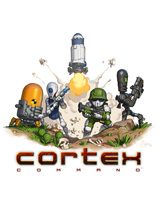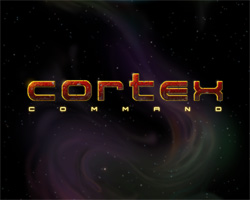

Cortex Command
developed by Data Realms (Phoenix, AZ)
public alpha/beta releases since September 5, 2004
“1.0” self-published September 28, 2012, for Windows/Mac/(Linux), $19.99
[trailer]
[website]
~120 MB
Played until declaring myself done for the foreseeable future, having successfully completed only the tutorial, in 1.5 hours, 1/27/15.
[15 min. video of the intro and tutorial level]
[17 min. video (with “Let’s Play” voiceover) of one the levels I spent time on]
According to my records, I bought “Humble Indie Bundle 3” at 8:18 AM on August 3, 2011, at which time it had six games in it. Four hours later, they announced that they had added “Humble Indie Bundle 2” to the ongoing deal, meaning that five more games were retroactively included in my purchase: Braid, Cortex Command, Machinarium, Osmos, and Revenge of the Titans. Braid I had already owned and finished, and Osmos I played to completion very shortly thereafter. The other three have waited, untouched, until now.
Yes, I only played an hour and a half, but it’s enough.
It’s a pure system game — a “sandbox” game — rather than a game with a direction. But it’s a dishonest sandbox game, in that it purports to be goal-oriented: defend your base, destroy the enemy’s base, etc. In fact those objectives are just the excuse for the only real point, which is the boiling bubbling chaos of the little dudes blowing each other up, flying around, digging holes, getting squished, etc. etc.
In theory that’s fine with me — all form is just an “excuse” for content — but this game has been developed with no interest at all in form, which is to say even less than what little it claims to have. There are hundreds and hundreds of options for weapons you can buy and bunkers you can build and ways you can have the little guys bash into each other, into which a decade of labor has clearly been poured… but when it comes to what you’re actually supposed to do, there’s suddenly an impression of schoolwork being grudgingly, minimally done: “yeah yeah, I know, the game needs to have some missions or something I guess. So, I dunno, how about these. Can I go now?” If this developer designed completely from the heart, I think he would admit that he doesn’t actually think it needs missions. He’s been poking at this game for more than a decade, and in all that time, he never made it his project to give meaningful form to the game. Form obviously isn’t something he believes in; he believes in options: Here’s the system; design your own fun. It’s very clear that that’s where he’s coming from. And it’s okay! To each his own. It just means accepting the limits of your appeal.
For the purposes of the general public, this isn’t a completed game — the developer says as much — and it’s not clear that it ever will be. Behind his words, I sort of sense him offering his fans a secret handshake: “if you’re the right kind of player, you’ll know that this game is complete. I just can’t admit that openly because this is a big project and I’m trying to take it, you know, all the way. I don’t know what that means exactly but I know it means impressing the people who aren’t impressed yet. So for the record, let’s say I’m going to continue developing it indefinitely.”
There’s something called “campaign mode,” but unlike every other game, there’s nothing linear or directed or narrative about the “campaign”; it’s just a layer of meta-strategy. Then there are a bunch of preset battle scenarios, but they’re really just open-ended prompts, rather than strict challenges, considering the vast catalogue of freedoms the player is given.
Also, none of it works quite predictably or perfectly. The chaos is really and truly chaotic; amusing at first and then frustrating as soon as you try to stake something on it.
It’s a game by and for people who love the particular stuff it’s made of, and are happy just to be provided with a pile of such stuff. Maybe even happier than if it had been provided in non-pile form. There are such people, I know.
I’m not one. I saw the stuff of this game — buy weapons! build bases! blow everything into tiny pieces and watch them flop around! — and felt sure it wouldn’t appeal to me, which is why I hadn’t played it before. But my idea now is to give every game a chance and let it make its case. The problem is that Cortex Command simply refuses to make its own case! It doesn’t want to tell me what to do, or how, or why that might be fun. It’s just there. If I have anything in mind to do with it, I’m welcome to. After an hour and a half I’ve run out of ideas. It was a blind date; it’s nobody’s fault. But if I wasn’t initially attracted to you and you’re not going to talk, then why drag this out?
Once again, my antisocial biases are probably the reason I’m responding as I am. I think the developer’s vision was to make a game for people to blow each other up while sitting next to each other. I don’t have a pal here who wants to do such thing, probably because I myself don’t particularly want to do such a thing.
Multiplayer videogaming has just never been as natural for me as it seems to be for many people. My fascination with computer games and my pleasure in other people’s company are at nearly opposite ends of my brain. At least now they are. I think earlier in my life it seemed more intuitive to me that they could fit together, but over many years I was gradually retrained to expect otherwise. My various private fascinations repeatedly came up against a lack of like-minded interest from the world around me, and that included computer games. There consistently just weren’t takers, so eventually I filed that away as a fact of life, so that I’d stop having to be lonely and frustrated about it. As a result, now I feel a kind of pre-emptive embarrassment and/or resentment thinking about trying to coordinate such things with other people. What other people.
Obviously, that’s all a shame, and it would be better if those parts of my brain were acquainted with one another once again. And I aspire to that. I just don’t think Cortex Command is gonna be the way.
But that’s me. If a reader wants to prove me wrong by proposing we play Cortex Command head to head, you know where to find me. (I can be reached most days at “Comments (0)“.)
“Data Realms” is basically just the one guy, Daniel Tabar, plus long-distance collaborators, principally Arne Niklas Jansson.